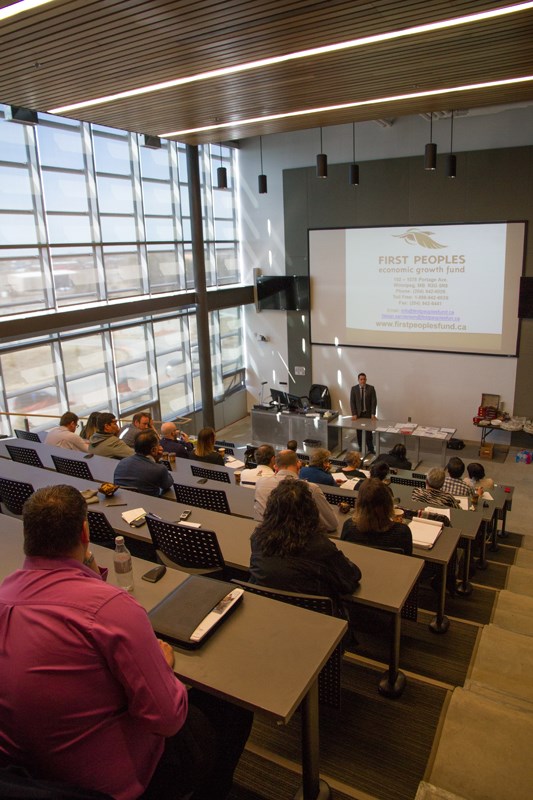Communities Economic Development Fund hosted its second annual Developer’s Forum April 27-28, providing both workshops for northerners already engaged in the business world, as well as giving lenders, advisors, and potential business partners the opportunity to introduce their services.
Many of the organizations came with offerings tailored to enterprising northern residents, and in particular, specialized loans for aboriginal entrepreneurs were a significant portion of programs offered. Jim Parks, with the Business Development Bank of Canada, presented the group’s Growth Capital for Aboriginal Business (GCAB) loan, which offered up to $100,000 for entrepreneurs who self-identify as aboriginal. The loan featured a unique rebate option for loans in good standing, where a portion of the interest would be returned in the form of a donation to a local organization or charity. “We know that giving back to the community is big in the aboriginal community, and that’s why we included it,” Parks noted. “This is the only program that has that feature.”
Shaun Hampton and Erica McDonald were also present to outline services provided by the Louis Riel Development Fund and the Métis Economic Development Fund. The LRCC, along with more conventional loans, also offered a non-repayable grant of up to $99,999, through the Business Equity Contribution Fund. The fund would cover a portion of a businesses capital and operating, marketing, and business supports for qualifying business models. However, businesses taking advantage of the loan will be subject to a three-year “control period”, where detailed financial and business reports are expected to be provided. Should a business not remain in business for those three years, a portion of the grant becomes repayable.
For more experienced business owners, the closely affiliated Métis Economic Development Fund provides equity loans of up to $500,000 in capital for start-up costs, mergers, and expansion, in exchange for a minority partnership of up to 35 per cent controlled by MEDF over a determined period of time. As recovery of funds is dependent on business success, equity loans from MEDF require a more experienced management team to qualify.
Both the LRCC and MEDF programs require a controlling share of the company to be owned by a Métis, Inuit, or non-status aboriginal individual as proven by genealogy or registration, and require the borrower to have accumulated 10 per cent of the total project cost in non-borrowed funds. Not all businesses are eligible, either: neither program is intended for businesses serving or selling alcohol, or VLT’s, nor are passive investments permitted.
Also presenting was Fabian Sanderson from The First Peoples Economic Growth Fund, a lender focused on for-profit businesses and job creation offering several programs for aboriginal entrepreneurs, including interest-free loans of up to $200,000 for up to 10 years. Much like the LRCC and the MEDF, majority ownership must be aboriginal, and “nefarious” businesses like alcohol or VLT’s don’t qualify. Uniquely, FPF offered a specialized loan for natural resource development available for larger borrowers such as development corporations and industrial partners.
Communities Economic Development Fund was, of course, there to showcase its own program offerings, custom-tailored to northern residents. CEDF CEO Oswald Sawh presented broader programs such as substantial lines of credit for both equipment and property development, but also programs tailored to residents of the rural north, such as commercial fishing loans. CEDF also offers community development and business services, including specialized training and networking services to assist small-scale harvesters of non-timber forest products (such as wild foods and medicinal herbs).
A loan’s return on investment depends on the success of the business of course, and several groups offered extensive services to help new businesses succeed. At the centre was the province’s own Entrepreneurship Manitoba, an agency which positions itself as the go-to fixer for potential business owners in Manitoba. As Chantelle Winters puts it, “We want to be your first point of contact when you’re starting a business in Manitoba.” EMB’s primary offering are its business review services, where the agency will work with you and potential lending and investment partners to develop a business plan that meets the potential partner’s requirements. EMB also offers prospective entrepreneurs a three-day business-planning workshop that rapidly orients first-time startups to what Winter calls “the business side of running a business.”
EMB also offers resources like a market research librarian, that can help business owners access marketing information like financial reports and trends across the province, or their “Ask the Expert” professional consultation program, or the online Bizpal Manitoba page, which allows entrepreneurs to quickly look up the permits required for any potential venture.
EMB works in close collaboration with Futurpreneur Canada, a national organization designed to help young entrepreneurs (18-39) succeed in the small business market. Spokesman Brad Hack noted that small business is a sector often underappreciated by the younger generation, despite making up 50 per cent of Canada’s GDP: “They’re a huge driver of our economy, and a lot of young people don’t realize that. They think they’re going to work for a big corporation, get a nice retirement package, and everything is going to be great. It doesn’t usually work like that.”
BDC also offers consultation services, from early business planning to later stage services like operational efficiency assessments and international expansion. BDC consulting partner Stace Gander provided a recent example of two Manitoban honey producers that he had helped to bring their products to international markets.
The second day of the conference featured workshops from CEDF professionals Sawh, Lorne Flamond, Darryl Bone and Shaheryar Qureshi, focusing on start-up themes such as community opportunities, start-up challenges and fundamentals, and capacity building.




